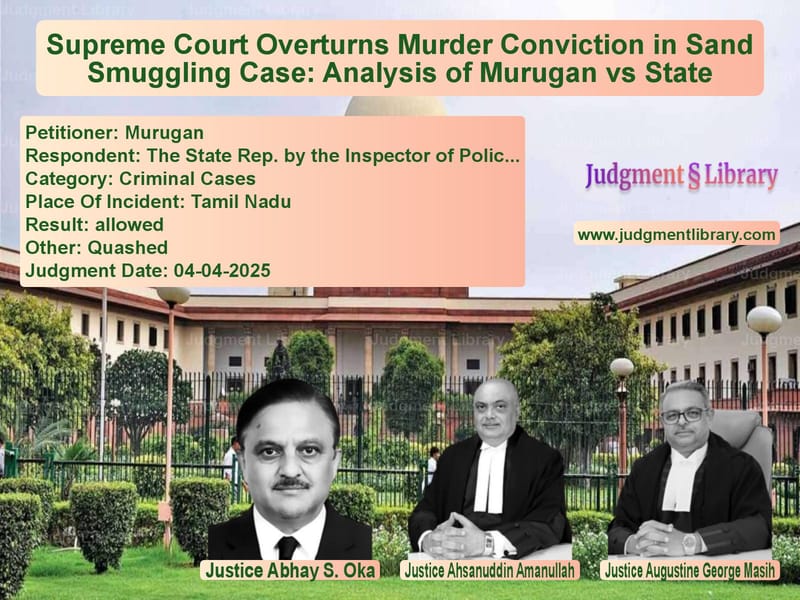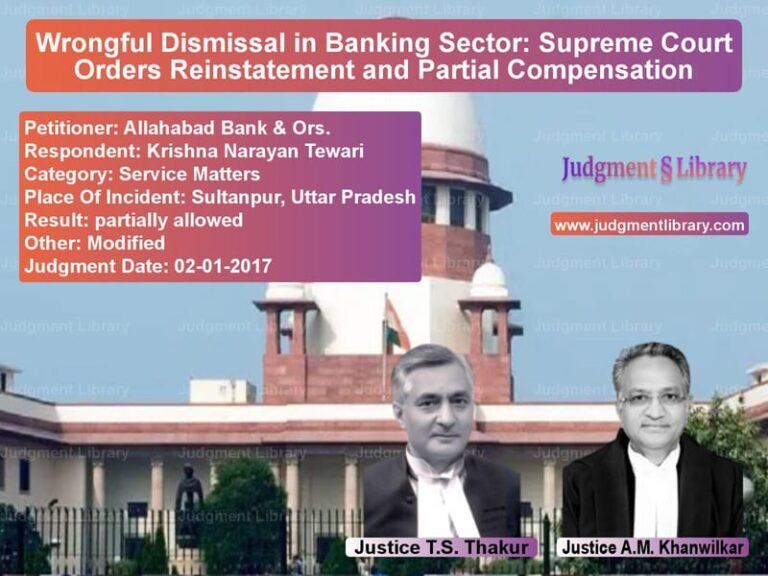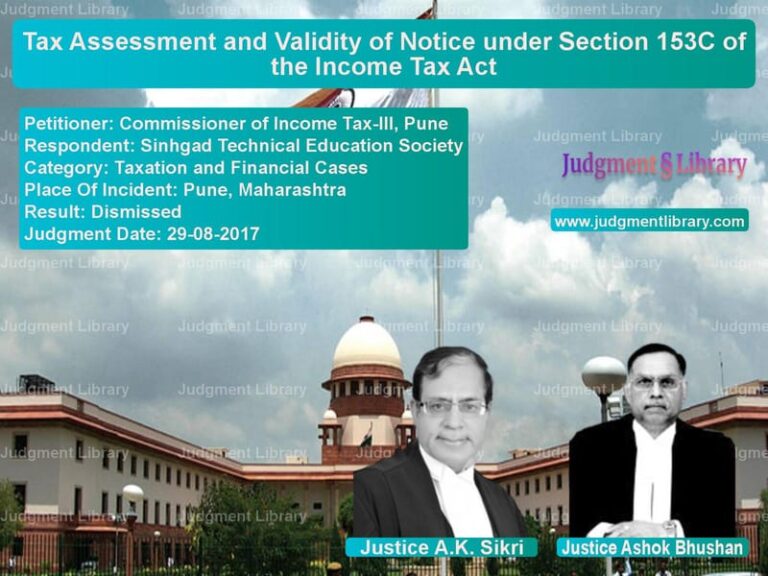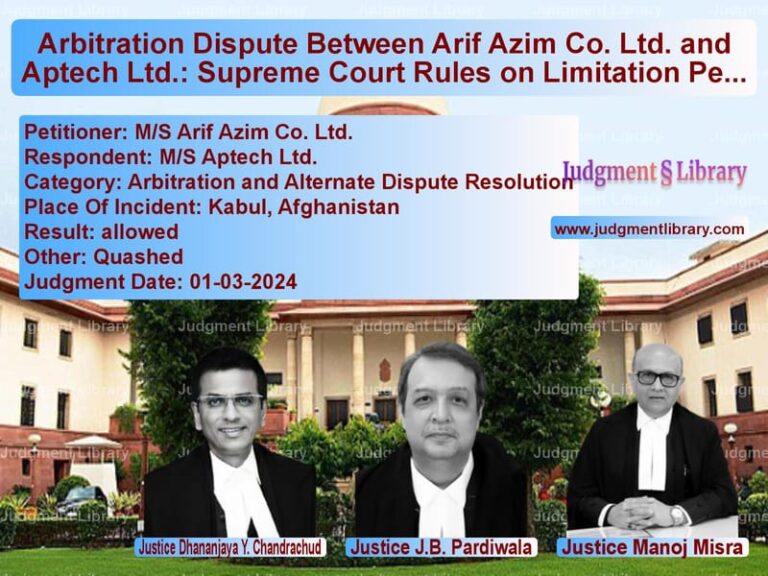Supreme Court Overturns Murder Conviction in Sand Smuggling Case: Analysis of Murugan vs State
In a significant criminal appeal judgment delivered on April 4, 2025, the Supreme Court of India acquitted Murugan of murder charges in a case involving the death of a police constable during an alleged sand smuggling operation. This detailed analysis examines the court’s reasoning, the key arguments from both sides, and the evidentiary issues that led to the acquittal.
Case Background
The case originated from an incident on May 6, 2018, when Special Branch Constable Jagadeesh Durai attempted to intercept a tractor-trailer allegedly carrying illegally mined river sand. The constable was found dead the next morning with head injuries. Six individuals were initially charged, with Murugan (A1) being convicted under Section 302 IPC (murder) and sentenced to life imprisonment by the trial court.
Procedural History
- Trial Court: Convicted Murugan under Sections 148 and 302 IPC
- High Court: Acquitted him of Section 148 but maintained Section 302 conviction
- Supreme Court: Full acquittal based on insufficient evidence
Petitioner’s Key Arguments
Murugan’s counsel raised several critical points challenging the conviction:
“The last seen evidence is that of Joseph – PW12, who claimed to have witnessed the incident while he was returning on the motorcycle from Valliyur along with Michael. The tractor-trailer was being driven at high speed by the appellant accompanied by two others being followed by the deceased constable shouting at them to stop. This was at night after 11:00 p.m. when, in the absence of any street light, chances of identification are very less.”
“The alleged confessions, if any, made on 10.05.2018 would be inadmissible being firstly in police custody and secondly, there was no occasion for these two to make such confessions.”
Other crucial defense arguments included:
- No sand was found in the tractor-trailer or nearby area
- Delay in FIR registration and submission to magistrate
- Key witnesses (Manoharan and Maharajan) not examined
- No case registered under Mines and Minerals Act
State’s Counter Arguments
The prosecution attempted to maintain the conviction based on:
“The call records clearly indicate that the deceased informed PW24 and PW1 about the theft of the river sand by all three accused. The intention was apparent, as during the run, the tyre of the trailer to the tractor having been damaged, the tractor had come to a halt and to avoid arrest at the hands of the deceased, the appellant and the co-accused proceeded to attack him, resulting in his death.”
The state relied on:
- Fingerprints on recovered ‘wheel spanner’
- Three pairs of slippers found at scene
- Call records showing deceased’s last communications
Court’s Critical Analysis
The bench comprising Justices Oka, Amanullah and Masih conducted a thorough evidentiary review:
1. Witness Credibility Issues
“The evidence of the alleged eye witness Tr. Arokiya Sesuraja – PW2 has been disbelieved by the High Court, which finding has not been challenged and has attained finality. Similarly, the extra judicial confessions of the co-accused (A2 and A3) before Maha Harichandran – PW13 having found to be made during the police custody thus not admissible, leaves no evidence against the appellant.”
2. Last Seen Doctrine Application
“What has come to light in his evidence is that he had given his statement to the Police under Section 161 on 23.05.2018, after 17 days of the incident. This, again casts doubt upon the veracity of the evidence of the witness. A person who recognizes not only the appellant but also the deceased and is also present at the time of postmortem would not have, in natural course, hesitated to approach the Police officials.”
3. FIR Delay Concerns
“The report and the FIR were presented to the Magistrate at 3:30 p.m. Explanation which has been put forth is that the delay occurred because of the transfer of the Magistrate as per the constable – PW20… No evidence has been produced with regard to the transfer of the Magistrate nor has the Head Clerk – PW15, in the Magistrate’s Court stated anything about the Magistrate’s transfer.”
Legal Principles Applied
The court relied heavily on Karakkattu Muhammad Basheer vs. State of Kerala regarding circumstantial evidence:
“Thus, these basic established principles can be summarized in the following terms that the chain of events needs to be so established that the court has no option but to come to one and only one conclusion i.e. the guilt of the accused person. If an iota of doubt creeps in at any stage in the sequence of events, the benefit thereof should flow to the accused.”
“In other words, the onus on the prosecution is to produce such evidence which conclusively establishes the truth and the only truth with regard to guilt of an accused for the charges framed against him or her, and such evidence should establish a chain of events so complete as to not leave any reasonable ground for the conclusion consistent with the innocence of accused.”
Final Judgment and Directions
The Supreme Court concluded:
“In these circumstances, merely the recovery at the site of the incident of a wheel spanner, which according to the prosecution has fingerprints of the accused on it and three pairs of slippers would not be enough for holding the appellant guilty of having caused the death of the deceased.”
The court:
- Allowed the appeal and set aside convictions
- Ordered Murugan’s immediate release
- Highlighted prosecution’s failure to establish complete chain of circumstantial evidence
Case Significance
This judgment reinforces several important criminal jurisprudence principles:
- Strict standards for circumstantial evidence cases
- Importance of witness credibility assessment
- Need for prompt FIR registration in serious crimes
- Caution against relying solely on recovery evidence
- Proper application of last seen doctrine
Petitioner Name: Murugan.Respondent Name: The State Rep. by the Inspector of Police.Judgment By: Justice Abhay S. Oka, Justice Ahsanuddin Amanullah, Justice Augustine George Masih.Place Of Incident: Tamil Nadu.Judgment Date: 04-04-2025.Result: allowed.
Don’t miss out on the full details! Download the complete judgment in PDF format below and gain valuable insights instantly!
Download Judgment: murugan-vs-the-state-rep.-by-th-supreme-court-of-india-judgment-dated-04-04-2025.pdf
Directly Download Judgment: Directly download this Judgment
See all petitions in Murder Cases
See all petitions in Bail and Anticipatory Bail
See all petitions in Custodial Deaths and Police Misconduct
See all petitions in Theft and Robbery Cases
See all petitions in Judgment by Abhay S. Oka
See all petitions in Judgment by Ahsanuddin Amanullah
See all petitions in Judgment by Augustine George Masih
See all petitions in allowed
See all petitions in Quashed
See all petitions in supreme court of India judgments April 2025
See all petitions in 2025 judgments
See all posts in Criminal Cases Category
See all allowed petitions in Criminal Cases Category
See all Dismissed petitions in Criminal Cases Category
See all partially allowed petitions in Criminal Cases Category







